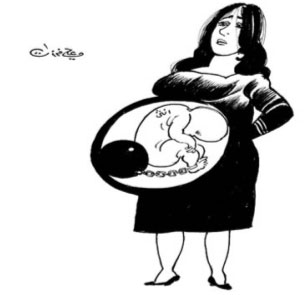Is Biology Destiny?
Is Biology Destiny?
Curator Masum Momaya Introduces “Biology”
For women in any political arena, is biology destiny? Do women gain power or lose power by what their bodies can and cannot do? Do biological differences between men and women decide what each is suited for and can accomplish: Raising children, tending homes, climbing mountains, serving in the military, negotiating policy and leading countries? Will the female body always be vulnerable in politics?
Throughout history, women have faced the argument that they are unfit for politics simply because they are women. Many of those who fought back have risked slander, exploitation and violence.
Women in the public eye have been labeled "prostitutes." In the Iran of the 1960s and 70s, parliamentarian Farrokhroo Pārsā was slandered as "sexually promiscuous" when she advocated for women's suffrage. At the outset of the Islamic Cultural Revolution in 1980, she was executed by firing squad, on charges of "spreading vice on Earth and fighting God."
Women activists in war zones such as Afghanistan, the Congo and Iraq live with the daily threats of disappearance, torture, rape and murder. And the reality is that many women are constrained from participating in public life by the devastating impact of domestic violence in their private lives and sexual harassment in their public lives.
It was once acceptable for politicians of both genders to claim that mothers were too "emotional" to run countries and fight wars, but recently, motherhood has also become an asset. For example, popular former French presidential candidate Ségolène Royal got many votes by explaining "I'm making policies by looking at what I would do for my own children."
Many suggest that the skills, social roles and life experiences related to mothering make women especially adept at resolving conflict and bringing about peace. As mothers, women make decisions about allocating often scarce resources, care for the health and welfare of many generations, sometimes under one roof, and negotiate with a host of "outsiders" so their families can live productively and in peace.
Mothers' protective instinct has demanded accountability from states who harm their children. The Mothers of the Plaza de Mayo in Argentina, who protested against the organized disappearances of their sons and daughters, are a heartbreaking and inspiring example. No politician, in Argentina or elsewhere, wants to go on record as having ignored mothers!
Biology can also be an asset when it comes to family connections. Women wield influence as wives and daughters. Be it Indira Gandhi, Michele Bachelet, Gro Harlem Brundtland or Hillary Clinton, family relationships allow women to "pull the strings" behind the scenes, and, in some cases, serve as stepping stones in their own political training, relationship building and ascent to power.
Finally, women have literally used their bodies as political tools. Whether through fasting, stripping naked, flaunting their sexuality, forming a human barricade, speaking publicly about "private experiences," taking up public space or even through art, women put their bodies on the line to make political statements.
Explore all the stories in this theme.


